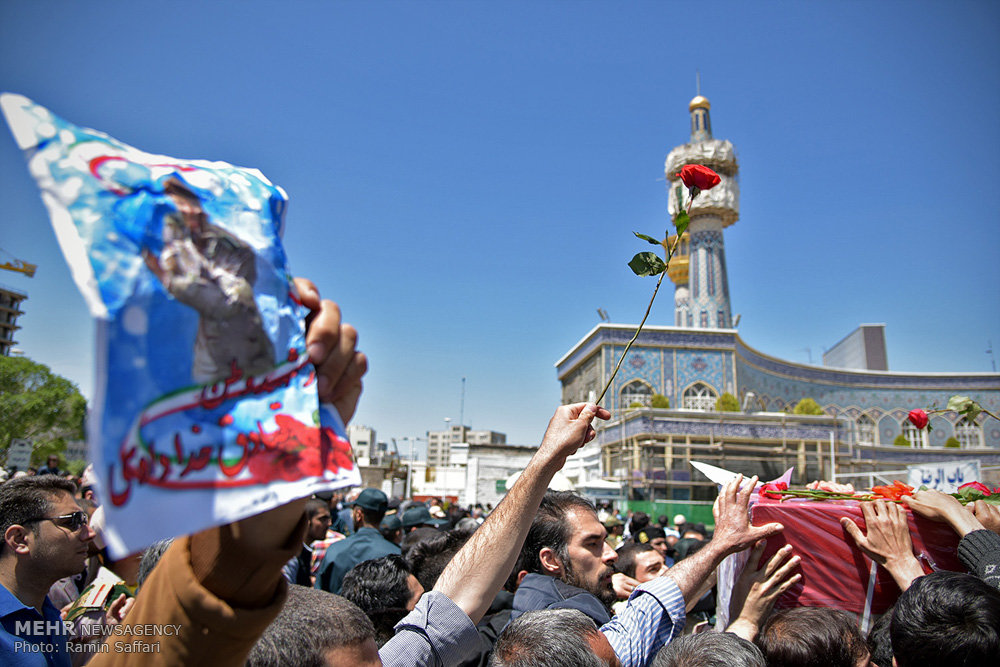Rouhani writes to Pakistan’s Sharif over dead soldiers

TEHRAN – Iran’s president followed up with a letter to Pakistani Prime Minister Nawaz Sharif the killing of nine Iranian soldiers by terrorists in an attack launched from neighboring Pakistan.
Hassan Rouhani on Friday demanded a quick probe into the attack by the Pakistani government.
“I ask the Pakistani government to act responsibly and identify, introduce, and punish the terrorist-Takfiri groups that committed this crime,” Rouhani’s letter to Sharif read.
Reportedly, the Iranian ambassador to Pakistan has delivered the letter to Sharif.
The terrorist ambush came just hours after Speaker of Pakistan’s National Assembly Sardar Ayaz Sadiq left Iran, calling for more security at the Pakistani frontier with Iran.
In the meantime, the Iranian police recognized Islamabad for bearing responsibility for wobbly security that allowed the terrorists to launch the attack.
On Thursday nine Iranian border guards were killed by terrorists in an ambush at the Pakistani border’s zero-point, near the Iranian town of Mirjaveh in the province of Sistan-Baluchestan.
The soldiers were reportedly killed with long-range guns shot from inside Pakistan.
The militant group called Jaish al Adl (meaning the Army of Justice) claimed responsibility for the attack.
Jaish al Adl has carried out several attacks before against Iranian security forces with the aim of destabilizing southeastern Iran.
The group claimed responsibility for attacks that killed eight border guards in April 2015 and 14 border guards in October 2013, as well.
In 2013, some sources linked to the terrorist group with the Pakistani and Saudi intelligences.
In his letter to the Pakistani prime minister, Rouhani made no explicit reference to any certain country, but accused regional countries of launching “proxy wars” and backing “terrorist acts, violence, and insecurity” to damage the Islamic world unity.
Previously, Iranian officials had rapped Riyadh for stirring up trouble among Iran’s Sunni ethnic minorities like the Baluch in the southeast of the country as well as among Arabs in the southwest.
Rouhani also ordered the Supreme National Security Council and Foreign Ministry to follow up on the issue.
The Foreign Ministry said on Friday it had summoned the Pakistani ambassador to protest the attack.
“The ambassador was told that Tehran expects the Pakistani side to take serious measures to capture the terrorists and punish them,” Foreign Ministry spokesman Bahram Ghassemi said.
“Countries which seek joining anti-terrorist coalitions must answer how they are incapable of countering armed bandits and terrorist groups on their own soil,” Ghassemi stressed.
In making the comments, he was hinting at Islamabad’s decision last week to send a former army chief to lead a Saudi-led alliance against Yemeni dissidents.
Also, Foreign Minister Mohammad Javad Zarif said his ministry “will spare no effort in following up the case through diplomatic channels to punish the terrorist thugs.”
Iran’s continuous concern over borders with Pakistan
Iran’s border with Pakistan has long been plagued by terrorist incursions in spite of security agreements with Islamabad, including one memorandum of understanding signed in 2014.
While Tehran says it honors its commitments to provide Islamabad with secure borders, it laments that the Pakistan side is falling short of its reciprocal commitments.
“Unfortunately, the Pakistani border with Iran is the most insecure one. This is while we have tried to provide most secure borders for them,” the Foreign Ministry said on Friday.
In a visit to Pakistan in 2016, president Rouhani highlighted the importance of “implementing” bilateral security agreements, months after Sharif underscored in Tehran that his country was “resolute” to cooperate with the Islamic Republic to soothe its concerns over the border.
In 2016, there were unconfirmed news that Tehran and Islamabad had reached an agreement on a joint military effort to assure closer border monitoring.
Following a 2014 attack by the Jaish al Adl terrorist group, Iran announced it would deploy unmanned aerial vehicles over its border for streamlined security throughout the area.
AK/SP/PA

Leave a Comment